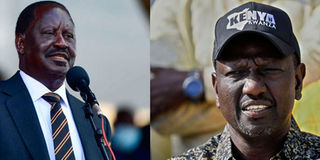You’ll know great leaders by the company they keep

ODM leader Raila Odinga and DP William Ruto.
Ugali, Chapati to cost more’ was the headline of the Daily Nation on May 9 – an unusual headline on a non-budget day. Yet the truth is that the economy has taken centre stage in the 2022 election campaigns. The leading contestants, Raila Odinga and William Ruto, have proposed different models for the revival and transformation of the economy.
Both have made reference to the economic transformation made by Deng Xiaoping of Hong Kong, Lee Kuan Yew of Singapore and Kim Dae-jung of South Korea. Additionally, both recently praised the late Mwai Kibaki for having built the modern Kenyan economy. If we can find common attributes among these leaders, we’d be able to choose great leaders in the coming elections.
To drive the point home, let us compare the leadership styles of some of the leaders in whose hands we passed. While in some schools the prefects were chosen from among the academically bright students, there was a school in our village whose headteacher believed good prefects were to be chosen from among the unruly pupils so as to maintain order.
Whereas for a long time this particular school never sent a single child to national school, those where excellent academic performance was the criterion for leadership consistently produced national school materials. In my former school, St Mary’s Yala, among other disciplinary requirements, the headboy and other senior student leaders were appointed from among the top in class. At that time, the school was always among the top 10 nationally and reported no student strikes.
The trend continues in tertiary institutions. For instance, at Strathmore University, the Student President has to have some minimum academic qualification, besides good behaviour. However, there also abound institutions where unruly students are placed in leadership and provided with a tension management budget so as to rule with an iron fist. In a nutshell, the type of leaders chosen by a head teacher, university administration or village chief tells us a lot about the leader who chose them.
Singapore’s success
The story is not any different from what leaders of the Asian Tigers did. Singapore’s success, for instance, can be attributed to five factors: the pragmatic leadership of the late Lee Kuan Yew and his successors; an effective public bureaucracy; effective control of corruption; reliance on the “best and brightest” citizens through investment in education and competitive compensation; and learning from other countries. The bottom-line is reliance on the “best and brightest” citizens, the professionals. The heads of the Asian Tigers deliberately picked their best and brightest citizens to contribute to the economic transformation of their nations. Even Kibaki’s presidency saw the highest number of professionals cross over to the government. He even presided over a constitution that recommended exclusion of politicians from the Cabinet in favour of technocrats.
Tell me your friends and I will tell you who you are, so goes the saying.
To choose the best leaders on August 9, Kenyans need to look at the history of the candidates as reformers as well as the professionals they surround themselves with. If they appeal to professionals, then that is a good sign. If they stick around those who are only good at insulting opponents, then they don’t deserve any seat.
Dr Ogola is Academic Director of MBA Programmes and Director, Institute of Strategy and Competitiveness, at Strathmore University Business School.





